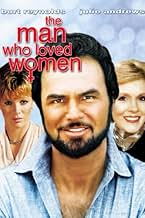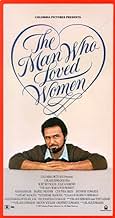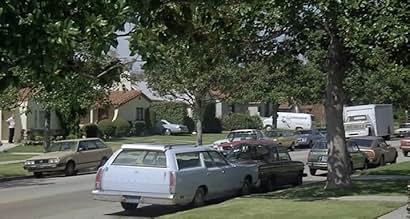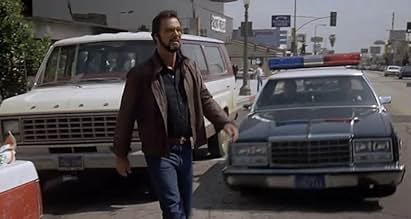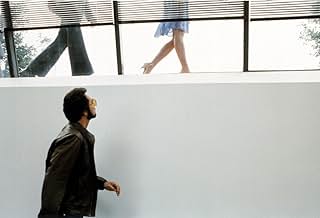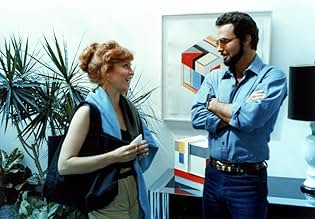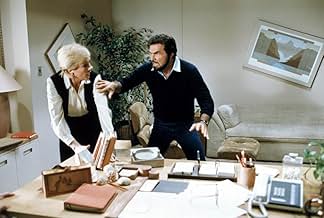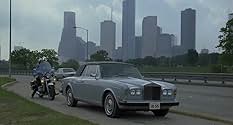NOTE IMDb
5,3/10
2,7 k
MA NOTE
Un sculpteur coureur de jupons, David, va chercher l'aide d'une psychiatre, Marianna, pour le guérir de son obsession pour les femmes.Un sculpteur coureur de jupons, David, va chercher l'aide d'une psychiatre, Marianna, pour le guérir de son obsession pour les femmes.Un sculpteur coureur de jupons, David, va chercher l'aide d'une psychiatre, Marianna, pour le guérir de son obsession pour les femmes.
- Réalisation
- Scénario
- Casting principal
Cynthia Sikes Yorkin
- Courtney
- (as Cynthia Sikes)
Herb Tanney
- Doctor
- (as Schweitzer Tanney)
Avis à la une
Blake Edwards in the Sixties was an amazing director, with a strong visual flair. I mean he directed "Breakfast at Tiffany's", "Days of Wine and Roses", and "An Experiment in Terror"! But somewhere in all that Pink Panthering he did in the Seventies he lost that visual flair and became boring. The only film in the last thirty years that showed any of the old panache was "Victor/Victoria". It's like there are two Blake Edwards.
That's not to say that this film is terrible - it's just that I think he could have done so much better. It's so dull to look at - despite the presence of his enchanting wife Julie Andrews, and one of Burt Reynolds' best performances. Also of note is a very young Kim Basinger displaying a strong flair for comedy. But Edwards' pacing of the action is so slow and ponderous that the moments of slapstick comedy seem completely incongruous and fall completely flat.
Come on Blake - give us some more of that old magic! I know it's still in you.
That's not to say that this film is terrible - it's just that I think he could have done so much better. It's so dull to look at - despite the presence of his enchanting wife Julie Andrews, and one of Burt Reynolds' best performances. Also of note is a very young Kim Basinger displaying a strong flair for comedy. But Edwards' pacing of the action is so slow and ponderous that the moments of slapstick comedy seem completely incongruous and fall completely flat.
Come on Blake - give us some more of that old magic! I know it's still in you.
Here is a picture that, for every conceivable reason, shouldn't work -- but on a purely emotional level, it does. Most viewers could be easily misled (and disappointed) by expecting a light romantic comedy or a wild sex farce. Instead, Blake Edwards and his co-screenwriters offer something entirely different, a picture far more complex, meaningful, and thought-provoking than what we might anticipate.
"The Man Who Loved Women" tells a sad, sad story about a middle-aged man (Burt Reynolds in one of his finest performances, as David Fowler) who drowns in isolation thanks to a rare ability: he's forced and driven, by instinct, to glimpse the sacredness and inner beauty of almost every woman he encounters. Yes, on some levels, his circumstances lead to a hedonistic paradise. But his feelings also prevent him from ever making a commitment, and isolate him from the joy of knowing one woman exclusively.
For that reason, a melancholic canopy hangs over the entire film and takes the front seat to humour. The story begins with David Fowler's death, and every event we witness onscreen is tinged by our knowledge that Fowler's obsession with women will eventually kill him. A slow, heavy, stringed theme song, Mancini's "Little Boys", plays softly throughout the film, and Fowler's words (in voice-over narration) constantly remind us of the deep, incurable loneliness that plagues him.
All of this might sound heavy-handed -- and it very well could be, if it weren't for the sexual fantasy and wild Edwards comedy that flesh out the story and provide relief. The melancholia and comedy work together, and Edwards achieves a delicate balance of mood --a bittersweet aura.
I've heard one criticism (see Ebert's review) that many of the story's psychological elements are impossible. Though a few scenes might suffer from exaggeration (hundreds and HUNDREDS of women attend David's funeral), one could easily dismiss the story -- as I did, at first --because so many male viewers *lack* Fowler's ability to care for women unconditionally; we want to believe that it's impossible for a contemporary Don Juan to exist. But that simply isn't tenable. My own theory about the film -- (and it's just a theory) -- is that Edwards may have pulled inspiration for Fowler from the late John Derek, another man worshipped and adored by women, who interacted with Edwards during the filming of "10" (1979).
Edwards and his co-writers lend a gentle touch to the film by crafting Fowler's character against-the-grain; while we might expect a narcissistic hedonist, he's just the opposite -- a warm, gentle, soul with only the sincerest motives. It's easy to understand why women are attracted to Fowler, from his first appearance onscreen. And, oddly -- male viewers may never begrudge Fowler his affairs, only applaud -- because his narration and his gentle spirit confirm the fact that he really does worship and adore everything about the girls who walk in and out of his life. "I keep thinking," he says sadly, "about all the women I'm never gonna know..."
In one of the film's most revealing and effective moments, Edwards allows us to glimpse a woman, at the funeral, who is the complete opposite of a "10" -- fat, homely, depressed -- undesirable. We have the distinct impression that her external appearance didn't matter to Fowler -- that he only looked into her heart and perceived her beauty. It lends credibility to psychologist Marianna's (Julie Andrews) observation: that David did, indeed, love all of the girls, equally and unconditionally.
"The Man Who Loved Women" tells a sad, sad story about a middle-aged man (Burt Reynolds in one of his finest performances, as David Fowler) who drowns in isolation thanks to a rare ability: he's forced and driven, by instinct, to glimpse the sacredness and inner beauty of almost every woman he encounters. Yes, on some levels, his circumstances lead to a hedonistic paradise. But his feelings also prevent him from ever making a commitment, and isolate him from the joy of knowing one woman exclusively.
For that reason, a melancholic canopy hangs over the entire film and takes the front seat to humour. The story begins with David Fowler's death, and every event we witness onscreen is tinged by our knowledge that Fowler's obsession with women will eventually kill him. A slow, heavy, stringed theme song, Mancini's "Little Boys", plays softly throughout the film, and Fowler's words (in voice-over narration) constantly remind us of the deep, incurable loneliness that plagues him.
All of this might sound heavy-handed -- and it very well could be, if it weren't for the sexual fantasy and wild Edwards comedy that flesh out the story and provide relief. The melancholia and comedy work together, and Edwards achieves a delicate balance of mood --a bittersweet aura.
I've heard one criticism (see Ebert's review) that many of the story's psychological elements are impossible. Though a few scenes might suffer from exaggeration (hundreds and HUNDREDS of women attend David's funeral), one could easily dismiss the story -- as I did, at first --because so many male viewers *lack* Fowler's ability to care for women unconditionally; we want to believe that it's impossible for a contemporary Don Juan to exist. But that simply isn't tenable. My own theory about the film -- (and it's just a theory) -- is that Edwards may have pulled inspiration for Fowler from the late John Derek, another man worshipped and adored by women, who interacted with Edwards during the filming of "10" (1979).
Edwards and his co-writers lend a gentle touch to the film by crafting Fowler's character against-the-grain; while we might expect a narcissistic hedonist, he's just the opposite -- a warm, gentle, soul with only the sincerest motives. It's easy to understand why women are attracted to Fowler, from his first appearance onscreen. And, oddly -- male viewers may never begrudge Fowler his affairs, only applaud -- because his narration and his gentle spirit confirm the fact that he really does worship and adore everything about the girls who walk in and out of his life. "I keep thinking," he says sadly, "about all the women I'm never gonna know..."
In one of the film's most revealing and effective moments, Edwards allows us to glimpse a woman, at the funeral, who is the complete opposite of a "10" -- fat, homely, depressed -- undesirable. We have the distinct impression that her external appearance didn't matter to Fowler -- that he only looked into her heart and perceived her beauty. It lends credibility to psychologist Marianna's (Julie Andrews) observation: that David did, indeed, love all of the girls, equally and unconditionally.
In the style of STARTING OVER, Burt took on another romantic lead in 1983's THE MAN WHO LOVED WOMEN, which starred Reynolds as a confirmed bachelor whose obsession with the opposite sex has driven him into therapy with a female shrink of course (Julie Andrews in a low-key performance). Though not as good as his performance in STARTING OVER, Reynolds does exude a great deal of charm in this film and get solid support from Andrews, Marilu Henner, and in an early and very amusing role, Kim Basinger as the undersexed trophy wife of a wealthy Texan (Barry Corbin)who likes her sex with an element of danger. This comedy that was co-written by Blake Edwards and his own psychiatrist is worth a look.
Has there ever been a film where Julie Andrews didn't do a good job? I thought she was great as David Fowler's analyst--so calm and poised, regardless of how ridiculous Fowler's problems got, or how agitated he became. Burt Reynolds was ... well, Burt Reynolds, but that's enough. Barry Corbin seemed a natural for the role of a Texas oilman/rancher in a cowboy hat. If he wasn't on 'Dallas' (and I don't think he was in the years I watched it), he should have been. I liked Marilu Henner as Agnes but wish we had seen more of her. I didn't recognize Kim Basinger or Sela Ward, but I like them both in most of what I've seen.
It wasn't a great film, but a good one. It was funny enough of the time, though it could be depressing.
It wasn't a great film, but a good one. It was funny enough of the time, though it could be depressing.
I just saw The Man Who Loved Women, and I found it to be a rather delightful movie. It's a plot you don't see to often; it's focused on one man and his love of women. The movie may seem pointless, but you'll get it once you see the ending. I won't ruin it here, but it was kind of depressing and unexpected, and looking back on the movie, I enjoyed it much more afterwards than during. It's not the most exciting movie. You won't see any amazing or dynamic cinematography or camera angles that are all to creative. In fact, it seems more like a movie from the '70's than 1983 in the way it was filmed, but if you like the kind of movies that you enjoy much more after having looked back on everything, I think you'll find this a rather enjoyable work.
Le saviez-vous
- AnecdotesThis movie, a remake, was released six years after François Truffaut's source French movie L'homme qui aimait les femmes (1977).
- GaffesWhen Julie Andrews unwraps the book on the plane, the front cover is visible before she flips it over to face her, but then when it is shown from her point of view, it looks completely different.
- Citations
Agnes Chapman: You're a fast worker. I better leave before one of us gets pregnant.
David Fowler: I'm not that fast.
- Bandes originalesLittle Boys (theme song)
Music by Henry Mancini
Lyrics by Alan Bergman & Marilyn Bergman
[Played over the closing credits]
Performed by Helen Reddy
Meilleurs choix
Connectez-vous pour évaluer et suivre la liste de favoris afin de recevoir des recommandations personnalisées
- How long is The Man Who Loved Women?Alimenté par Alexa
Détails
- Date de sortie
- Pays d’origine
- Site officiel
- Langues
- Aussi connu sous le nom de
- The Man Who Loved Women
- Lieux de tournage
- Houston, Texas, États-Unis(Texas scenes.)
- Sociétés de production
- Voir plus de crédits d'entreprise sur IMDbPro
Box-office
- Budget
- 12 000 000 $US (estimé)
- Montant brut aux États-Unis et au Canada
- 10 964 740 $US
- Week-end de sortie aux États-Unis et au Canada
- 1 347 032 $US
- 18 déc. 1983
- Montant brut mondial
- 10 964 740 $US
- Durée
- 1h 50min(110 min)
- Mixage
- Rapport de forme
- 1.85 : 1
Contribuer à cette page
Suggérer une modification ou ajouter du contenu manquant


